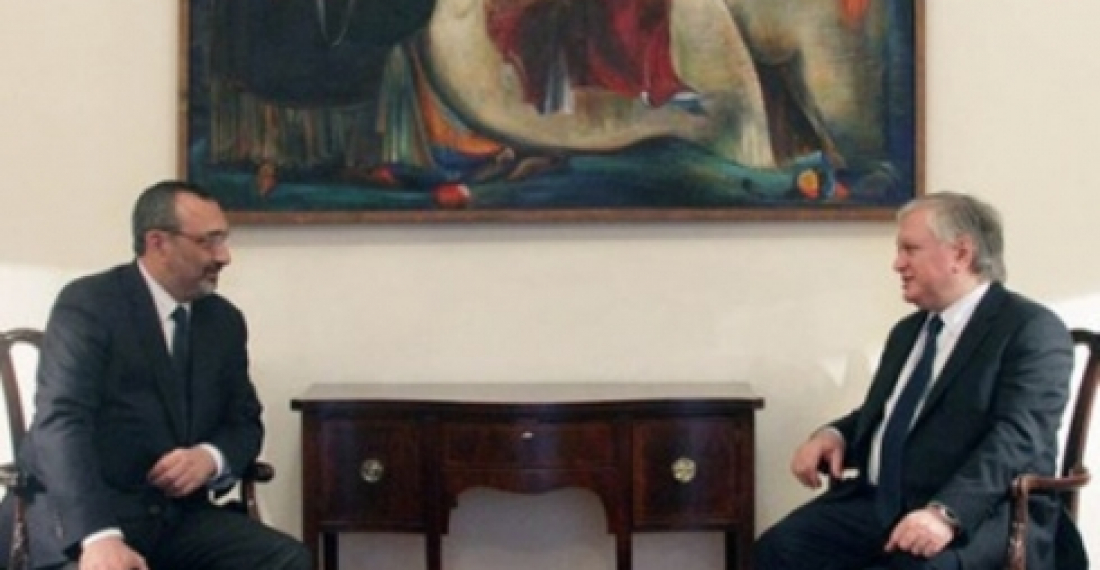Министр иностранных дел Армении Эдвард Налбандян в четверг (4 июня) принял в своем офисе в Ереване министра иностранных дел самопровозглашенной Нагорно-Карабахской Республики Карена Мирзояна.
В кратком заявлении, опубликованном на сайте МИД Армении, говорится, что в ходе встречи Налбандян и Мирзоян обсудили события вокруг процесса мирного урегулирования нагорно-карабахского конфликта и "коснулись положений по карабахскому урегулированию, содержащихся в Декларация Рижского саммита ЕС и Восточного Партнерства".
По данным того же источника "Эдвард Налбандян и Карен Мирзоян обменялись мнениями относительно регионального визита действующего председателя ОБСЕ, его встреч с руководством Армении и Арцаха."
По словам политического редактора commonspace.eu, хотя такие встречи и не являются необычными, но они стали более частыми и структурированными в последнее время, в момент когда армянская дипломатия работает над укреплением своих позиции на международной арене по нагорно-карабахскому вопросу. Самопровозглашенная Нагорно-Карабахская Республика (НКР) не признана ни одним государством, но при этом может рассчитывать на сильную поддержку со стороны армянских диаспор во всем мире. Несмотря на претензий НКР быть в полной мере представленным на переговорах по конфликту в рамках Минского процесса ОБСЕ, которые некоторые отвергают, а другими считается преждевременными, тот факт, что он де-факто контролирует территорию Нагорного Карабаха сильно укрепляет позиции НКР на переговорах.
Азербайджан очень чувствителен к любым контактам между международным сообществом и де-факто властями НКР, и в общем и целом успешно сдерживал официальную международную деятельность с этим образованием. Однако, он не в силах предотвратить частные визиты людей из мира политики, спорта и культуры в Карабах и их взаимодействия с властями Нагорно-Карабахской Республики. Позиция ОБСЕ отличается, так как ему поручено содействие разрешению конфликта, то, как ожидается, оно должно сотрудничать со всеми заинтересованными сторонами. Встреча, состоявшаяся в среду в Ереване, между председателем ОБСЕ и руководством НКР вписывается в этот контекст.
Однако, как многие считают, с армянским населением в Нагорном Карабахе должно быть больше взаимодействия со стороны международного сотрудничества, так как изоляция не способствует разрешению конфликта, и позволяет закрепиться жесткому осадному менталитету. Хотя многие обвиняют азербайджанскую сторону за жесткую позицию по этому вопросу, когда он объявляет персоной нон грата любого человека посетившего Карабах без ведома властей Азербайджана, некоторые из них также говорят, что часто де-факто власти НКР прибегают к ненужным процессуальным требованиям.
Карабахский конфликт никогда не будет решен без поддержки заинтересованных сторон, которые непосредственно вовлечены в него - народ Нагорного Карабаха, будь то армяне или азербайджанцы. А это требует проявления гибкости от всех сторон к максимально свободному и открытому диалогу.
Источник: commonspace.eu
фото: Министр иностранных дел Армении Эдвард Налбандян на встрече с министром иностранных дел самопровозглашенной Нагорно-Карабахской Республики Кареном Мирзояном, 4 июня 2015 года. (Фото любезно предоставлено пресс-службой Министерства иностранных дел Армении).






